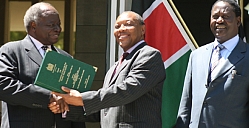Moreno Ocampo’s Legal Problems with Kenya

 |
| The Waki Report handover Photo Courtesy |
Crimes against humanity, alongside genocide and war crimes, are regarded as the most serious crimes ever known to mankind. By categorizing Kenya’s post election crimes among these heinous conducts, the Waki Commission obligated the Kenya government to investigate, apprehend and prosecute all those suspected of being responsible for committing those crimes regardless of official status, constitutional immunities and other privileges, an almost impossible task for national authorities who were themselves accused of being implicated.
Curiously, absent from the Commission’s report is a definition of crimes against humanity or what principles guided the Commission into concluding that Kenya’s post election violence amounted to such serious prohibited conduct. The commission (in my view) owed the Kenyan public a clear exposition of the legal basis on which it decided to place a domestic violence that claimed less than 1500 lives alongside such mind boggling conflicts as the Rwanda Genocide (800,000 Dead), or the DRC (5,000,000 dead), and the viciousness or brutalities of northern Uganda (30,000 child soldiers) or Darfur conflicts (2.5 million displaced). Repulsive as crimes in
What makes crimes against humanity such a horrendous conduct settling this crime a part from any other, is the presence of the element of a policy or plan by the state or organizations to exterminate or persecute a section of its own population. Without this policy element, violence no matter how callous does not simply rise to the level of crimes against humanity. One would have wished that the Waki Commission gave this important element some attention, which unfortunately it did not, other than merely pointing to attacks being organized along ethnic lines by some groups against other ethnic groups. It may be noted that the Waki Commission leaned heavily on the findings of the 1908 Akiwumi Commission for its conclusions. Akiwumi Commission however, despite an invitation to do so, did not recommend prosecution for crimes against humanity.
The first task by the ICC Prosecutor will therefore be to determine whether
The latest decision by Kenya’s cabinet to reject the ICC option signals a change of attitude by the Kenyan government which only a month ago had rushed to sign an agreement with the ICC prosecutor promising to refer post election suspects to the ICC should it be unable to form a special Tribunal by the month of September.
The ICC Prosecutor has also to grapple with the problems posed by the principle of complementarity which governs relationship between the ICC and states. Complementarity was developed by states during the negotiations at
Complementarity assures states that so long as they are able and willing to conduct their own investigations and prosecutions, they will be left alone to carry out these tasks. The terms “inability” and “unwillingness” are elaborately defined by the Rome Statute suggesting that states were not willing to cede to the ICC too much discretion of making interpretations which may turn inimical to state sovereignty. “Inability” occurs where the judicial system of a state is unavailable or has been partially or substantially destroyed by the conflict so that the state cannot realistically be expected to carry out its task of investigations and prosecutions. “Unwillingness” on the other hand envisages the situation where proceedings against the accused have commenced but are conducted or have been conducted in a manner to suggest that the accused is being shielded from justice.
Delay in forming the Special Tribunal notwithstanding, cannot by itself form the basis for the intervention of the ICC Prosecutor. International experience suggests that such tribunals can take a considerable time to form in a volatile domestic situation. The Special Tribunal of Lebanon is a case in point. This Tribunal which became operative only this year is prosecuting crimes surrounding the 2004 assassination of Prime Minister Rafiq Hariri. The delay was as a result of an intransigent parliament that was out to frustrate formation of the tribunal by refusing to ratify an agreement between the Government between the Government and the United Nations.
Another problem the ICC Prosecutor will encounter arises out of the country’s Constitutional arrangement. Chapter iv of the Constitution establishes a judicial hierarchy consisting of the High Court as a court of unlimited jurisdiction, Court of Appeal, subordinate courts and Kadhis’ courts. Parliament may establish other courts, but these shall be subordinate to the high Court. That status of the International Criminal Court has not been defined in the constitution suggesting that the Court cannot effectively discharge its duties in
Section 77(1) of the constitution provides for trials only before “ an independent and impartial court established by law” the ICC Stat uses the word ‘surrender’ which implies a superiour/subordinate relationship rather than “extradition” which is the word commonly used for interstate cooperation and connotes reciprocity and equality. It should be noted that the ICC is not a court of a foreign sovereign state to which extradition treaties apply and neither is it a UN Security Council subsidiary like the ICTY and ICTR which by virtue of chapter vii power of the UN Charter would enjoy a vertical authority over state parties. The ICC is an International institution created by a multilateral treaty and can only enjoy such status as is conferred to it by its stature which must of necessity be transposed into
At first sight it would appear as though the International Crimes Act has satisfactorily settled this question, but a closer scrutiny suggests otherwise. The Act is in two sections; the first merely creates new offences (genocide, crimes against humanity and war crimes) in
By Boniface Njiru,
Advocate of the High Court of
